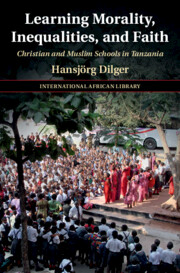Book contents
- Learning Morality, Inequalities, and Faith
- The International African Library
- Learning Morality, Inequalities, and Faith
- Copyright page
- Contents
- Figures
- Acknowledgements
- Note on Language Use
- 1 Introduction
- Part I (Post)Colonial Politics of Religious Difference and Education
- Part II Moral Becoming and Educational Inequalities in Dar es Salaam
- 4 Market Orientation and Belonging in Neo-Pentecostal Schools
- 5 Marginality and Religious Difference in Islamic Seminaries
- 6 Privilege and Prayer in Catholic Schools
- 7 Conclusion
- References
- Index
- Titles in the Series
4 - Market Orientation and Belonging in Neo-Pentecostal Schools
from Part II - Moral Becoming and Educational Inequalities in Dar es Salaam
Published online by Cambridge University Press: 16 December 2021
- Learning Morality, Inequalities, and Faith
- The International African Library
- Learning Morality, Inequalities, and Faith
- Copyright page
- Contents
- Figures
- Acknowledgements
- Note on Language Use
- 1 Introduction
- Part I (Post)Colonial Politics of Religious Difference and Education
- Part II Moral Becoming and Educational Inequalities in Dar es Salaam
- 4 Market Orientation and Belonging in Neo-Pentecostal Schools
- 5 Marginality and Religious Difference in Islamic Seminaries
- 6 Privilege and Prayer in Catholic Schools
- 7 Conclusion
- References
- Index
- Titles in the Series
Summary
Chapter 4 describes the establishment of two schools by the pastor of one of the largest neo-Pentecostal churches in Dar es Salaam against a background of processes of social segregation as well as spiritual insecurity in the context of perceived urban ambiguity. The two schools; which cater to students from different socio-economic backgrounds; foster class formation among students and staff; as well as the ethos of a ‘caring discipline’ among the teachers. At the same time; there are significant tensions among the staff; which result from concerns about national and ethnic favouritism and from a rigid system of performance monitoring. On the other hand; however; the two schools also establish networks of local; national; and international belonging; which are particularly valued among teachers hired from abroad. Furthermore; an essential part of the two schools’ reputation derives from the fact that they are perceived as faith-oriented schools providing ‘moral education’. However; articulations of faith and morality play a rather implicit role in the everyday practices of the schools; not only with regard to the learning of values but also in the context of the (informal) healing prayers that are conducted for (exclusively female Muslim) students believed to have been exposed to evil spirits and witchcraft attacks.
Keywords
- Type
- Chapter
- Information
- Learning Morality, Inequalities, and FaithChristian and Muslim Schools in Tanzania, pp. 99 - 136Publisher: Cambridge University PressPrint publication year: 2021



